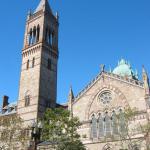Ross Douthat recently speculated on the state of evangelicalism in the United States and it was significantly for what he left out. On the 500th anniversary of the Protestant Reformation, Douthat chose not to mention any of the heirs of original Protestantism — either Lutherans or Reformed Protestants. The closest he came to one of the sixteenth-century communions was Anglicanism and that was only in reference to his interlocutor, Alan Jacobs, professor of English at Baylor University who worships among one of the Anglican communions while also keeping a foot in evangelical Protestantism.
Why wouldn’t the descendants of either Martin Luther or Ulrich Zwingli (or John Calvin) be on Douthat’s radar? For instance, my own denomination, the Orthodox Presbyterian Church, still holds to as many of the Reformation’s convictions as evangelicals have abandoned — from predestination to male only ordination. But at a staggeringly undersized demographic of 30,000 members, Douthat could readily conclude that holding on to the Reformation comes with a high price tag in twenty-first century America. But what about the Lutherans? In the United States, the Missouri Synod has a membership of somewhere near 2 million, not a figure over which you readily giggle. Then the Wisconsin Evangelical Lutheran Synod has more church members than even the Presbyterian Church in America (roughly 400,000 compared to 350,000) and no one has ever heard of WELS unless you follow confessional Protestantism (which is a name for Protestant communions that still confess the creeds of the original Protestant churches).
One reason that Orthodox Presbyterians and Missouri Synod Lutherans may not register either with Douthat or the leaders of North American evangelicalism (think Christianity Today and Fuller Seminary) is that neither church has been very enthusiastic about a religious agenda for the nation. Lutherans owe their reluctance to embrace Christian nationalism to the theological tradition of two-kingdoms, the idea that God rules human affairs in a two-fold way, one through the means of grace administered by the church, the other through the magistrate’s enforcement of civil law. For Orthodox Presbyterians their ambivalence about mixing religion and politics owes to the doctrine of the spirituality of the church. That conviction teaches that the church’s task is principally spiritual and declarative — i.e., declaring the word of God. And since the Bible has little to say about politics (unless you want Old Testament Israel’s theocracy), the church should, as the Westminster Confession says, “handle, or conclude nothing, but that which is ecclesiastical: and [should] not to intermeddle with civil affairs which concern the commonwealth, unless by way of humble petition in cases extraordinary.”
Evangelicalism is different. Its most recent origins in the 1940s point to a movement that attempted to unite Protestants outside the mainline churches into some sort of organizational order for the sake of restoring Christianity as the vital center of national life. Not only do the earliest documents of the National Association of Evangelicals indicate a desire to construct a “conservative” alternative to the liberal Protestant establishment, but Billy Graham really became a national figure once he started at his 1949 Los Angeles crusade (REALLY!!!) to preach against Communism.
That difference — a religious zeal to assist a nation or a church that wants to be a church — may explain why Douthat thinks more about evangelicals than Lutherans or Presbyterians. As Douthat explains, the reasons why younger believers like Lecrae want to get out of evangelicalism has everything to do with the movement’s politics and almost nothing to do with the theological and liturgical reforms that animated Luther, Zwingli, and Calvin:
…the alienation of younger evangelical writers from Trumpism’s court pastors could indeed be a signifier of a coming evangelical crackup. In this scenario the label itself would become contested, with the kind of winsome and multiethnic evangelicalism envisioned by the anti-Trump Southern Baptist Russell Moore pitted against the nationalist evangelicalism of a Jerry Falwell Jr. or Robert Jeffress, and churches along the fault line internally embattled and dividing.
But it’s also possible that evangelical intellectuals and writers, and their friends in other Christian traditions, have overestimated how much a serious theology has ever mattered to evangelicalism’s sociological success. It could be that the Trump-era crisis of the evangelical mind is a parochial phenomenon, confined to theologians and academics and pundits and a few outlier congregations — and that it is this group, not the cultural Christians who voted enthusiastically for Trump, who represent the real evangelical penumbra, which could float away and leave evangelicalism less intellectual, more partisan, more racially segregated … but as a cultural phenomenon, not all that greatly changed.
If so, then this would imply that white Christian tribalism and a very American sort of heresy, not a commitment to scripture and tradition, has kept evangelical churches thriving all these years.
That’s another way of saying that church membership, ordination, sacramental carefulness, faithful exegesis, and ecumenical procedures have never seriously mattered to evangelicals. The major correction is that evangelicalism is not a church. It’s a movement, sort of like being a Yankee’s fan. You have similar favorites and shared experiences. But you don’t actually belong to an institution (no matter how much Red Sox Nation tempts you to think you have seceded from the United States).
So, in the year of the Reformation’s 500th anniversary, couldn’t those pundits writing about Protestantism in the United States pay a little attention to those Protestants for whom the reform of the Western Church matters?












